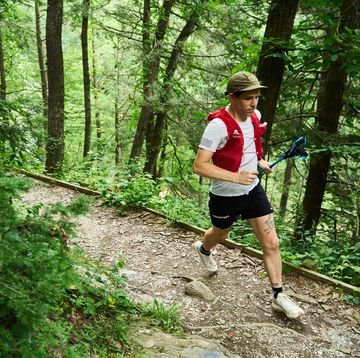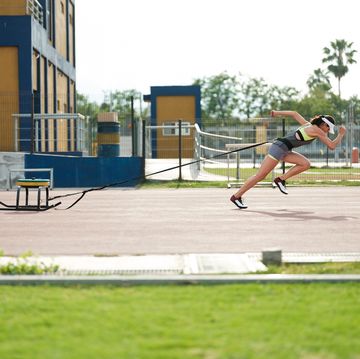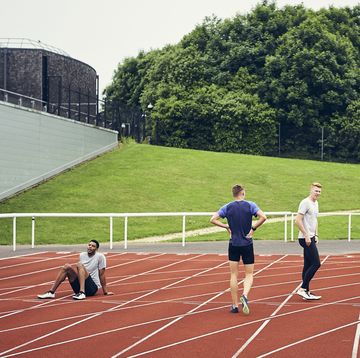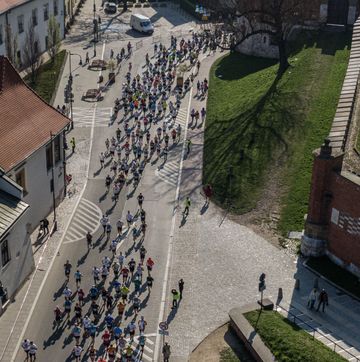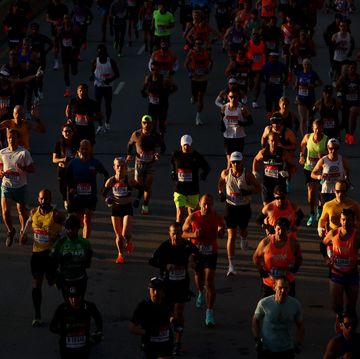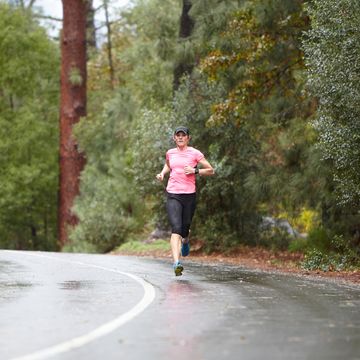Do you want to mess with Bill Rodgers' mind? Here's how. In the woods along Farm Road, five miles from his house in Sherborn, MA, is a water bottle. When Rodgers runs by it, he stops, drinks and restashes it. When the bottle is empty, he carries it home, refills it and drives to its hiding spot to return it. I'm often tempted to go there one night, empty the
bottle and imagine Rodgers' consternation when next he stops for a drink.
I learned about the bottle on one of my first runs with him. Last March, I was asked to write a book with him. As a result, we got together at least once a week for nearly a year, and I got to go to his house to work and run -- not necessarily in that order of importance -- many times.
Like most people who have been exposed to him, I thought I knew Rodgers pretty well. You know the image: spacey, easily distracted and, like George Bush encountering a checkout scanner, perpetually amazed by things that most of us long ago took for granted. When working on the book, we spent a lot of time sitting by the window of a coffee shop near Boston's well-traveled Freedom Trail. While there, we'd usually see amphibious Duck Boats, which carry tourists through Boston's streets and onto the Charles River. Nearly every time Rodgers would spot one, he'd let out his trademark "HmmmH!" -- imagine a calf being goosed, and you'll have the sound about right -- and then say, in one of those what-will-they-think-of-next voices, "You know, Scott, they go in the water, too! HmmmH!" Although I found his mannerisms to be even more endearing than I had imagined, they also made working with him a challenge, as I found myself playing traffic cop to his ruminations. I'd ask about psychological tracks of the racing trade, and a minute later, he'd be reminiscing about how strong Leonid Moisev's handshake was at the 1978 Fukuoka Marathon.
But as we spent more time together, I began to see that the common perception of Rodgers is a misperception. Consider the water bottle. For most of us, staying hydrated means drinking a club soda between our third and fourth beers. Yet here's a 48-year-old who has been running competitively for more than 30 years, and he daily attends to minute details the way a peaking Olympic marathoner would. Put another way, everyone talks about the weather. Rodgers does something about it.
Through my job with Running Times, I'm fortunate to come into contact regularly with world-class people of all sorts -- writers, businesspeople, visual artists and, of course, runners. Rodgers is the most focused person I've ever met. Check that: Rodgers is the most sustainably focused person I've ever met. Certainly, other runners have come and gone who have been more intense; Alberto Salazar and John Campbell come to mind. But that's the point: They've gone, while Rodgers is alone among his contemporaries in being, as he says, "still enthralled by the simple task of seeing how fast I can run.
"In training," he says, "I think about an upcoming competitor. Before the Bix 7-miler, I might be doing hill repeats and really be whipped, but I'll think about Gary Romesser, and I'll get fired up. I know he's going to be there, and he's going to be ready, so I can't slack off just because it's July and the weather is tough." I wonder if such thoughts run through Frank Shorter's head these days.
"Racing," Rodgers says, "is all about rationing your resources." So, too, for him, is life. But let him further the analogy. "That's what our sport is all about: over a long time, you have the sustained effort," he says. You don't take breaks, even when the emphasis is so strong not to do that, that it can be overwhelming. I train to achieve that -- to be relentless in my effort."
On a grand scale, that relentless effort takes the form of constructing and conducting his life so that racing at the level that he aspires to, though not the object of every-minute obsession, is nonetheless primary. What that requires is a lot more than what you see of him when he's signing autographs before a race. "Long ago," Rodgers says, "I made the determination to be like this in this part of my life. People have ascribed this whole Peter Pan thing to me. Maybe in some ways I am like that, but I always thing, 'You really have me all wrong.'" Here, Rodgers lets out a long, loud laugh, reveling in the strength that he draws from others' misunderstanding of him, and from the knowledge that he can use their error to his advantage.
"Most people wouldn't want to live my life," he continues in a suddenly pensive tone. "People don't want to go through that much hard training, that much boredom. If they did, we'd
"I know lots of athletes who have a lot more talent than me, but their energies are pointed in other directions. People think that I'm scatterbrained. Well, you don't win Boston four times if you're scatterbrained. You have to be like Cosmos Ndeti. You have to say, 'This is it. Nothing can stand in my way.' I've done two-hour runs at JFK Airport. It's not exactly nice running on access roads, but you have to get it in. If you let other things interfere, fine, but you're not going to beat me."
Don't give in to the temptation to ascribe these events to Rodgers' spaciness and miss the bigger point. As we worked on the book and talked about everything from race strategy and cross training to motivation for masters and charity runners, Rodgers always came back to one central theme: the futility of approaching running with preconceptions. In his view, if you turn running into fulfilling so many yes-or-no checklists, whether on the day of a race or when reviewing the past year, you're bound to fall short and eventually wonder why you ever found anything attractive about this whole stupid running thing. "You need to always be evaluating your running," he says, "and figure out how to make it work for you. You need to always keep a fresh approach. If you have the right approach -- and that's going to be different for different people -- you can retain that kid-like view of your running. You do that, and you've found the fountain of youth."
Part of the adjustment that allows him to sustain his focus is an increased sense of self-satisfaction. "I've always thought of myself as just a runner," he claims, as if any of us could have run 2:09 despite having stopped to tie a shoe. "But as I've aged, I've realized you really need to learn how to set your standards of success. After I ran that 15:17 -- I was second overall -- this woman came up to me and was all sorry for me because I hadn't won. I told her that I was happy and that the guy who beat me was 20 years younger. She just had no idea what that performance when you're 47 means. Now, there's a certain part of my psyche that needs to be acknowledged and rewarded by others. That's one of the reasons I stopped running marathons -- the rewards weren't there, given what it took just to get to the starting line. Maybe that'll change if I go after the 50-and-over mark. But I've learned that I need to get away from others' assessments of my running. It's tricky, though -- I've never gotten old before!"
I could recount countless similar incidents of Rodgers' childlike ways. Not to play the pop psychologist too much, but it's this part of his personality that allows the Bill Rodgers you don't know to flourish. That is, he has figured out how to have the spacey and intense sides play off each other, so that he can maintain that 97 percent focus that he has sustained for nearly 25 years. This means appearing detached in casual conversation, going kayaking with Gail and their two daughters, enjoying Kahlua and cream, and so on, but only as doing so adds to his running. "I'm always thinking about how I can recover quickest for the next run," he says. "Sometimes that means putting my feet up; sometimes that means running easy; sometimes that means forgetting about running completely. I'll always remember Lasse Viren doing shots of straight vodka. If you didn't know any better, you'd think he wasn't serious. Yes, he was getting drunk, be he had also trained three times that day, and I knew that he'd be training three times the next day."
His two-edged congeniality also works away from the starting line. "People still don't think I have a fierce side," he said. "I always try to talk to my competitors before a race, and I still see that certain runners will think they have me beaten because I seem so low-key. They don't realize that I'm doing my homework through these conversations, just like a football team reviews its opponent's strategy." Or, as his brother, Charlie, puts it, "Bill is always a gentleman around his competition. What they don't know is that later, we'll be talking about some guy, and Bill will get this look in his eyes, and say, 'I'm going to hammer him.'"
"I was doing a radio show down in North Carolina," Rodgers relates, "and the guy doing the show said, 'So, Bill, I guess you didn't make as much money as Michael Jordan this year.' 'Yeah,' I told him, 'but I could whup him good in a 5-miler.'"
have a lot more good distance runners. Even a lot of the elite guys don't want to keep at it. I don't do a lot of things that my friends do. Ten years or so ago, Rob de Castella, Greg Meyer, Bruce Bickford and all these characters were always going out golfing and bugging me to go with them. I'd say to them, 'What do you want to go golfing for? Your'll be out in the sun for three hours. You'll get dehydrated. You have to take care of yourself.'"
He adds, unnecessarily,"Most people aren't going to think that way. People think that I'm just really talented and that I've done well mostly because of that. Tom Fleming thinks that he's a runner who didn't have that much talent and that he just worked really hard. I used to tell him, 'Tom, I work pretty hard, too. You can beat me at 400 meters, so you have more leg speed than me.'
Again, it's important to emphasize the first part of the "sustainably focused" equation. Sports psychologists say that one thing that distinguishes elite runners from the general population is their lack of anxiety, their ability to adjust to the situation at hand. Rodgers epitomizes this trait. So you wake up in a friend's house on the morning of the 1976 New York City Marathon and discover that you haven't packed running shorts? No biggie. Just borrow a pair of soccer shorts from a teenager who lives next door, and beat Shorter while winning the race in the second-fastest time of your life. Or you get to the 1975 World Cross Country Championships and realize that you've forgotten spikes? Why worry? Borrow a pair from teammate Gary Tuttle, and then place third in your first world-class race. And nearly 20 years later, when you've been at the race-travel game forever, you find yourself at a 5-mile road race in Ohio without racing shoes? What else to do, but buy a pair of cross country flats that are a size too small and haven't been made by your shoe sugar daddy, win the race and then ditch the shoes at the first opportunity?
Rodgers has found his fountain of youth in masters racing. "To me, it's all still fresh," he says. "Yes, it's tougher as I get older; I'm more tired now doing 70 to 90 miles a week than I used to be doing 130. But, you know, I'm still doing pretty darned good. Last summer, I ran 15:17 for 5K. Now, I could say to myself, 'Boy, I used to be able to run a bunch of those back to back, and now I can only run one.' What good would that do? That 15:17 was the best I could do on that night, and was pretty close to my American record. That's the nitty gritty -- how did I do on that day?" At age 48, Rodgers, who was ranked the top marathoner in the world three times in the '70s, looks forward to turning 50 with the same enthusiasm as the trophy junkie in a local running club.
In some ways, the thought of Rodgers getting old is comical. The Bill Rodgers you do know is very much alive and, as far as I can tell from talking with his wife, Gail, and other long-time acquaintances, unchanged. After one run froths house, we sat down for the day's first meal at about 1 p.m. Rodgers poured himself a huge bowl of Corn Pops; in his youth, they were more accurately called Sugar Pops, and while eating the renamed teeth rotters, Rodgers continually sang an old jingle, "Sugar Pops is tops." After a few bites, he sprang up, fetched a jar of peanut butter and slathered a hefty amount of it on the rim of his cereal bowl. Then every five bites or so, he'd line the spoon with peanut butter before plunging it into the Corn Pops. At the same time, he drank from a mug. The first few go-rounds, it contained ice cubes and a reconstituted sports drink. Then Rodgers heated up a can of tomato soup, offered me some -- "It's good fluid replacement, you know" -- and when I declined, filled the mug with it. When soup time was over, he poured Diet Pepsi into the same mug. By this time, what little appetite I had after running 18 miles on a hot day disappeared as I envisioned sports drink, tomato soup and Diet Pepsi molecules battling for space on the slivers of ice that I could hear sliding around in the mug. Rodgers stayed the course. He refilled the mug with the sports drink, downed it in one gulp and then exclaimed with the satisfaction of Michael Jackson obtaining a preteen's phone number, "HmmmH! Good!"
Rodgers is complex enough for even his wide-eyed charm to have more than one spin. True, he's one of the most genuinely nice people you'll ever meet, but there's more to it than that. "When I'm at the start of a race," he says, "I always introduce myself to the runners around me. Being an older runner, I can't start as fast as some of the younger guys around me, and many runners are overanxious at the start. There might be a lot of pushing. So I figure that if I spread a little goodwill around, they're more likely to give me a break in the first few hundred yards, and I might not get bumped around as much." Now be honest. Name one space cowboy who thinks through every level of race detail to that degree.
It's that continual velvet-glove hammering that will stick with me must now that, regrettably, Rodgers and I have finished our book project. With our interactions less frequent, I sometimes find myself reverting to the space cowboy mode of thinking about him. Then I recall this story.

Scott is a veteran running, fitness, and health journalist who has held senior editorial positions at Runner’s World and Running Times. Much of his writing translates sport science research and elite best practices into practical guidance for everyday athletes. He is the author or coauthor of several running books, including Nutrition - Weight Loss, Advanced Marathoning, and How Much Rest Should You Take Between Intervals. Scott has also written about running for Slate, The Atlantic, the Washington Post, and other members of the sedentary media. His lifetime running odometer is past 110,000 miles, but he’s as much in love as ever.



